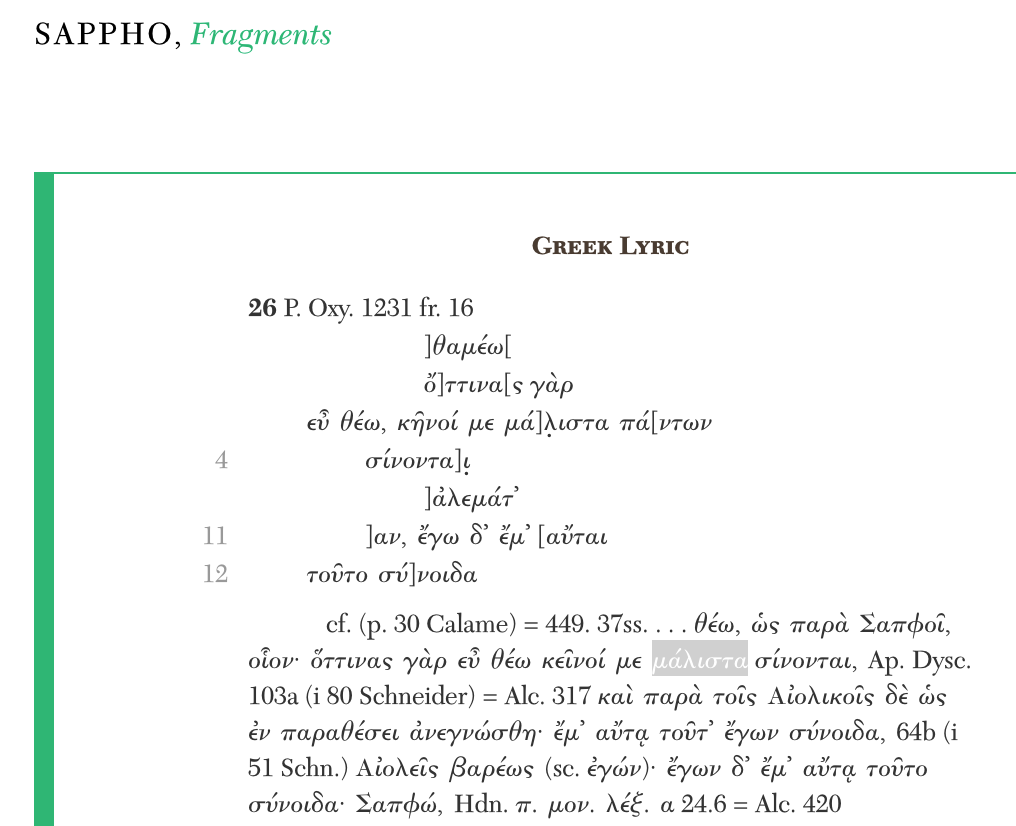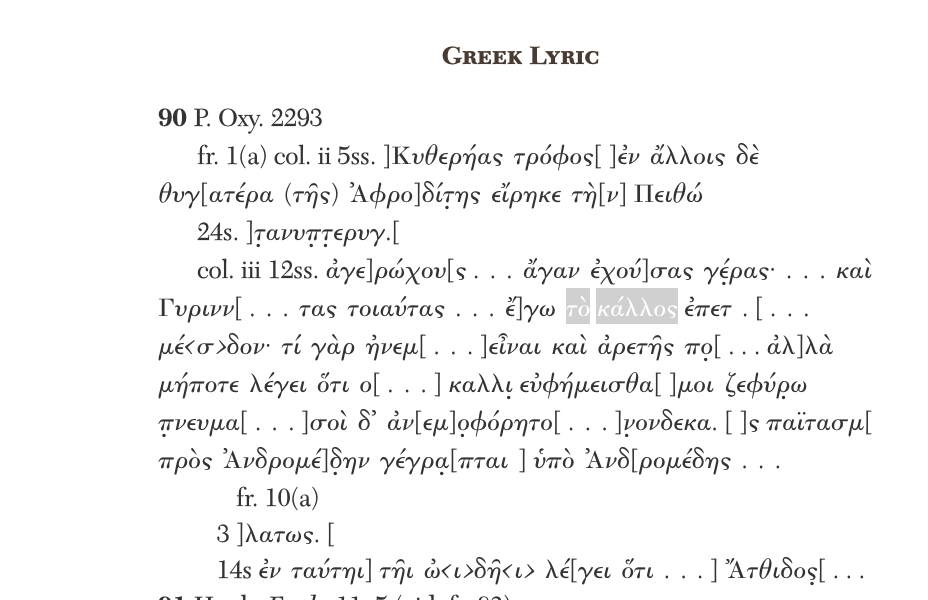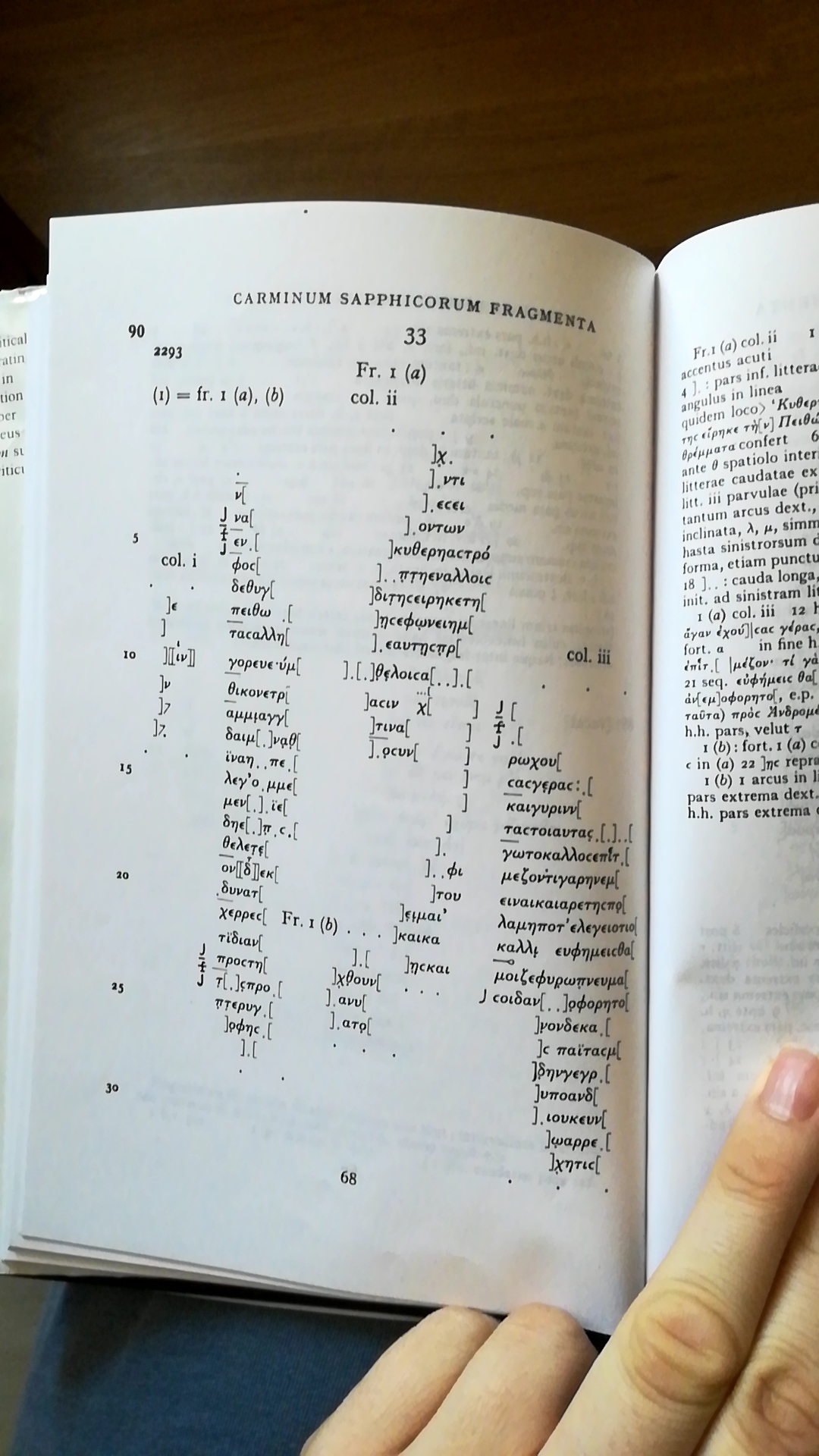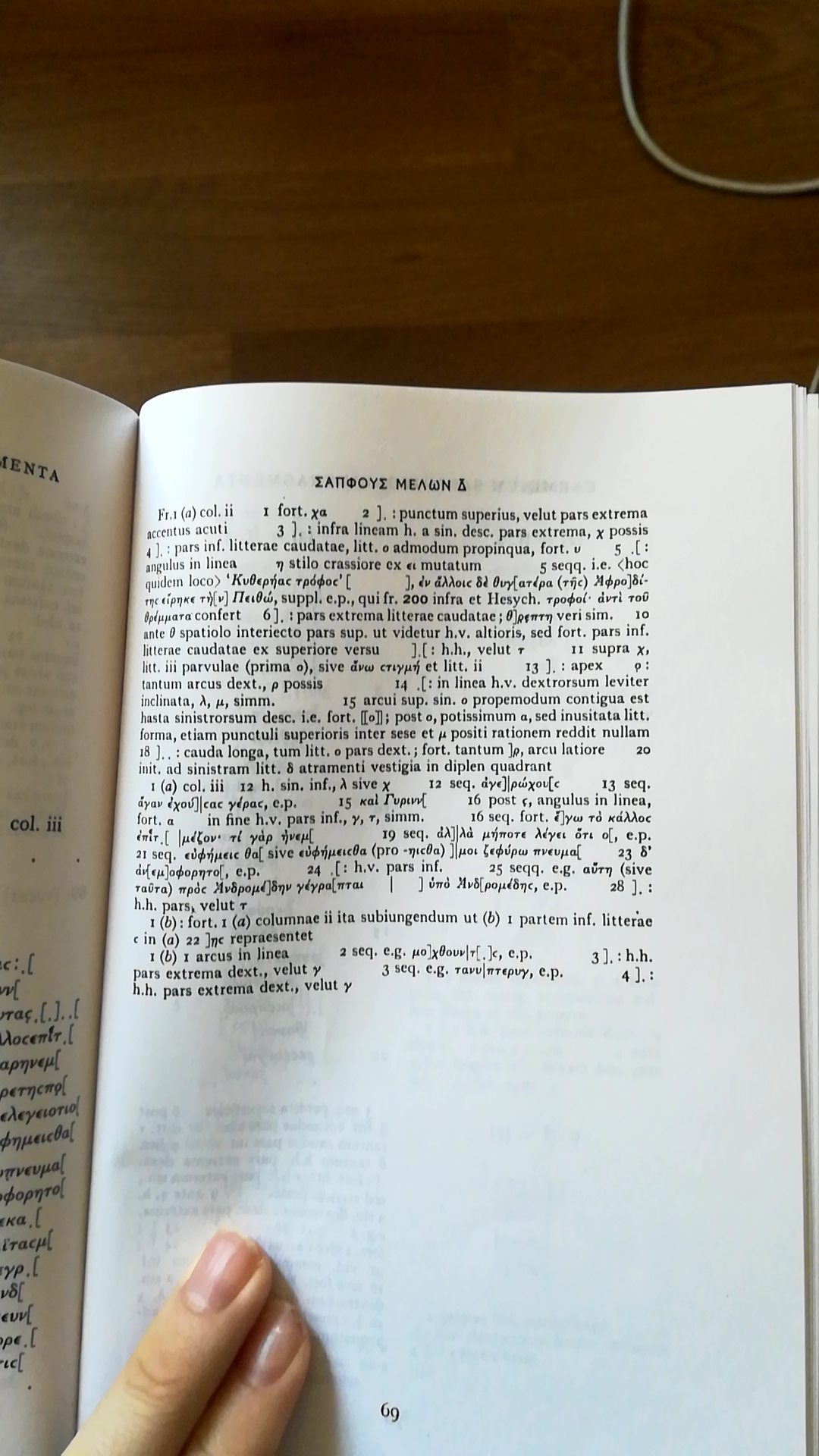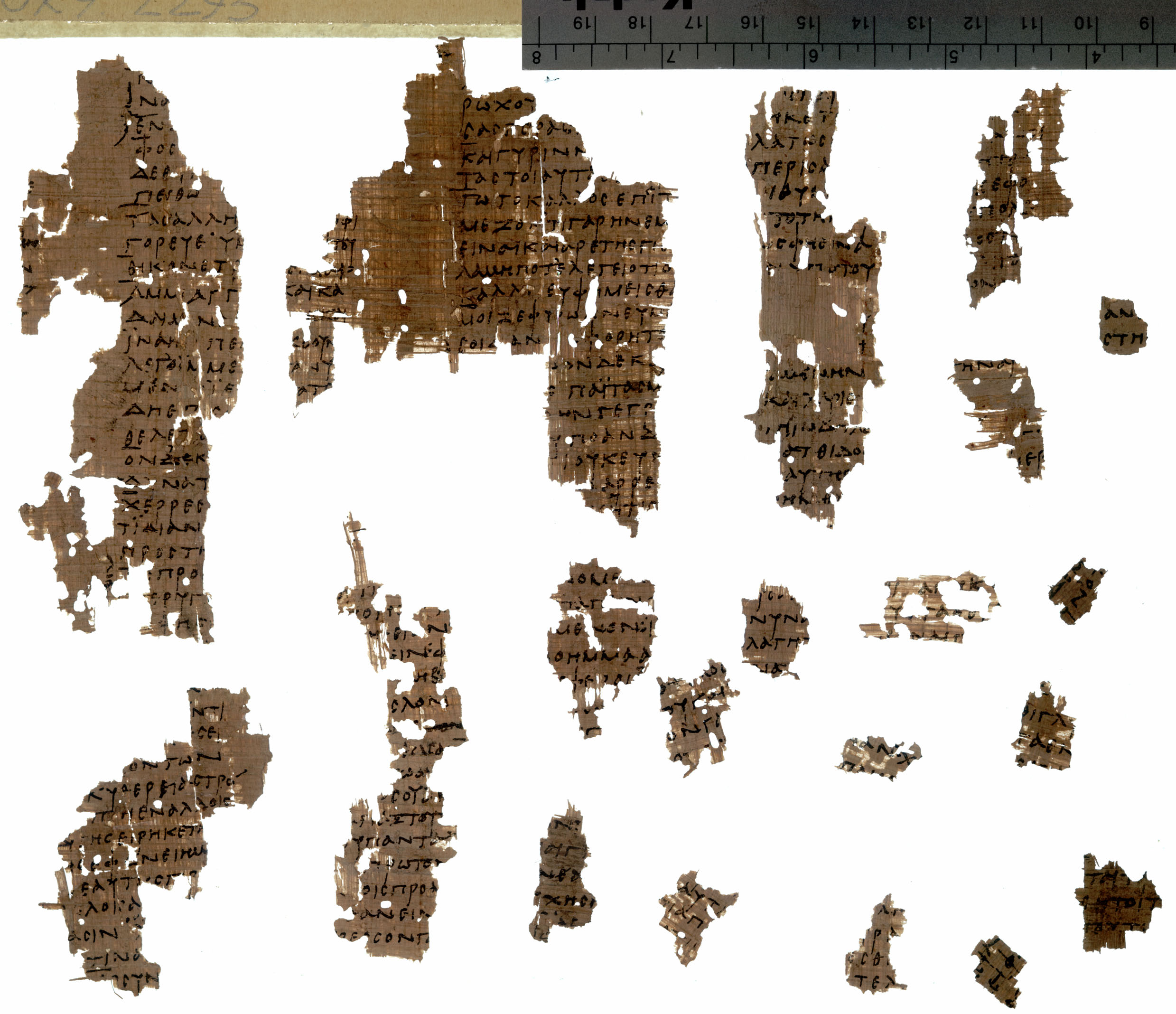I'm back with another question like this one, to which I leave the background part. So among the sources I found while researching Sappho back in the days is The Complete Poems of Sappho, which I am currently comparing with my other sources. I just scrolled to the end and found this curious mishmash of stuff:
{
Αεριων επεων αρχομαι αλλ’ονατων [ε] γω το καλλος επιτ[μεζον]…
οφθαλμοις δε μελαις
νυκτος αωρος και ποθηω και μαομαι ουκ οιδ
οττι θεω διχα μοι τα νοηματα κατ’ εμον σταλαχμον
ου τι μοι υμμες ας θελετε υμμες [ο] ττινας
γαρ ευ θεω κηνοι με μαλιστα παντων σινοντα[ι]
εγω δ’εμ’[αυται τουτο συ]νοιδα
μη κινη χεραδος ου γαρ θεμις εν μοισοπολων οικιαι
θρηνων εμμεν
ου κ’αμμι ταδε πρεποι
}
Ignoring the semi-random line breaking, this is what I see in this mess:
- Sappho Edmonds 1a, which I think is actually part of the preface to an edition of Sappho where the edition is made to speak, and reads Ἀερίων ἐπέων ἄρχομαι ἀλλ' ὀνάτων, or in Edmonds' translation "The words I begin are words of air, but, for all that, good to hear".
- The object of the question.
- Sappho Edmonds 141A, which Edmonds adds a χύτο into to get ὀφθάλμοις δὲ μέλαις χύτο νύκτος ἄωρος.
- Sappho Edmonds 23, καὶ ποθήω καὶ μάομαι.
- Sappho Edmonds 52, Οὐκ οἶδ' ὄττι θέω· δύο μοι τὰ νοήματα, or with δίχα instead of δύο as is found here and in Lobel-Page.
- Sappho Edmonds 17, κὰτ' ἔμον στάλαγμον (or στέλεγμον as in Edmonds, and I think στάλαχμον is also seen somewhere else than here, hopefully not just in that horrid Spanish edition of the linked post).
- Sappho Edmonds 59, οὔ τί μοι ὔμμες (Edmonds elides μοι).
- Sappho Edmonds 50, ἆς θέλετ' ὔμμες.
- Sappho Edmonds 13, ὄττινας γὰρ εὖ θέω, κῆνοί με μάλιστα σίνονται (Edmonds σίννονται).
- Sappho Edmonds 15, ἔγω δ' ἔμ' αὔτᾳ τοῦτο σύνοιδα (Edmonds takes it from P.Oxy. and adds ]λαν· at the start).
- Sappho Edmonds 78, μὴ κίνη χέραδος (Edmonds χέραδας).
- Sappho Edmonds 108, Οὐ γὰρ θέμις ἐν μοισοπόλων οἰκίᾳ θρῆνον ἔμμεν οὔ κ' ἄμμι τάδε πρέποι, where the mishmash has something closer to the manuscript version than Edmonds' emendation.
But what in the world is number 2? This time, having learnt the lesson from the previous question, I googled it, and this mishmash is all that came up. I found this, which suggests those are the lyrics of the group Avaton's rendition of "one of Sappho's poetic fragments", and gives the following translation to the mishmash, only vaguely matching it:
I start my song with ethereal soft words. In my life I served beauty.
Along the night, when dark sleep captures my eyes and desire burns me and excites my body,
I know not what to do: my mind is divided drop after drop the pain within me…
No, it’s not you who for me, as much you want it,
For they whom I benefit injure me most...
Yes, I have placed this deep in my mind and I know it.
Leave the pebbles and don’t mix them up. Lamentations are not be heard into poets’ homes.
Such things are not appropriate for us.
By the way, the line breaking in this thing's "lyrics" is different from the above mishmash. Then you listen to the video, and it doesn't correspond at all! Of all the mess up there, all you can hear in the video is Ἀερίων ἐπέων ἄρχομαι, and then there are a couple more Sappho fragments to be identified, none of which are in the above mishmash!
With all that, does any of you guys recognize this corrupted fragment, which seems to read as follows?
[ἔ]γω τὸ κάλλος ἐπιτ[μέζον]
Or can you even just recognize what the last word(s) may be, with ἐπιτ[μέζον] apparently supposed to translate to "served in my life" or a subset thereof?
Extras
Here's what I actually hear in the lyrics:
Ζαελεξάμαν ὄναρ Κυπρογένηα (twice, Edmonds 123)
ἄγι χέλυ δῖα φωνάεσσα (twice, part of Edmonds 80)
Ζαελεξάμαν ὄναρ Κυπρογένηα (twice, Edmonds 123)
ἄγι χέλυ δῖα φωνάεσσα (twice, part of Edmonds 80)
α! [some scat singing]
Ἀερίων ἐπέων ἄρχομαι (number 1 above, twice)
ἄγι χέλυ δῖα φωνάεσσα ἄγι χέλυ δῖα (twice, part of Edmonds 80 with a repetition)
[some scat singing]
[more scat singing]
α! [second scat singing bit]
[scat singing again]
[Perhaps ναί (modern Greek for "yes") over and over?]
[More scat]
[Still more scat]
[Guess what? Scat]
[Um, guess]
[And more!]
Yeah, three unrelated fragments, mishmashed together randomly with one being randomly cut, a lot of scat and a lot of instrumental parts. Nothing to write home about, au contraire.
Note
The Complete Poems of Sappho gives this as Wharton 12 and Cox 12. Wharton 12 is actually just Edmonds 13 (ὄττινας γὰρ) without the πάντων δηὖτε from the mistaken integration of that quotation into P.Oxy. 1231 fr. 16, which TCPOS reports right after the mishmash with that integration. I don't have Cox so I cannot verify if Cox 12 has anything to do with the mishmash. UPDATE Assuming this is Cox digitized, Cox 12 would be the same as Wharton 12, found in this weird pseudoromanization:
... O?'ttinas ga`r eu?^ ðe'w kh^noi' me ma'lista ci'nnontai ...
